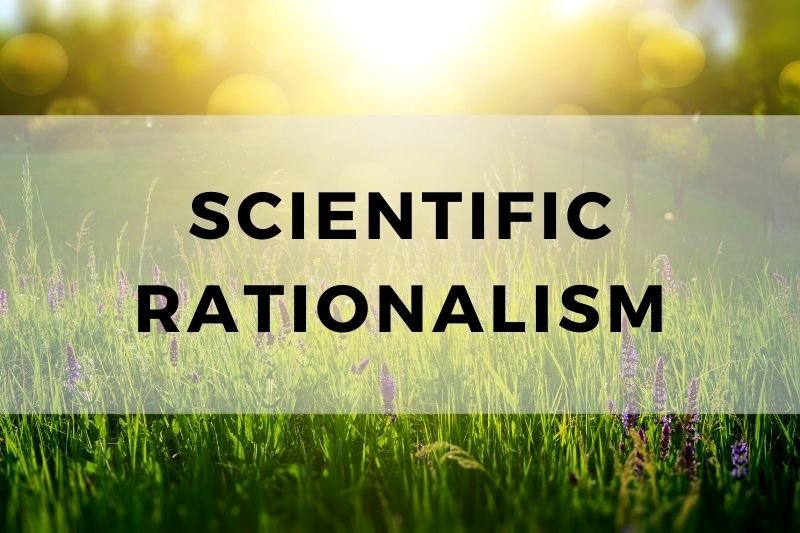
Scientific Rationalism is a key philosophy in understanding the relationship between knowledge and science. It emphasizes reason as the primary source of knowledge, guiding scientific inquiry. By prioritizing logic and evidence, this approach challenges the idea that emotions or subjective experiences can lead to truth.
Scientific Rationalism builds on rational thought, aiming for a more structured, objective view of the world. It has influenced how we approach problems and develop new theories. This guide will explore its foundations, key figures, and practical applications in the world of science today.
What is Rationalism?
Rationalism is the belief that reason is the primary source of knowledge. It argues that the mind can grasp truths without relying on sensory experience. According to rationalists, logic and reasoning lead to clear and certain knowledge. This contrasts with empiricism, which emphasizes sensory experience as the basis for knowledge. Rationalism holds that some truths are innate or can be discovered through pure reasoning. It has shaped many fields, from philosophy to science. The core idea is simple: reason, not the senses, provides the foundation for understanding the world.
What is Scientific Rationalism?
Scientific Rationalism is the application of reason to scientific inquiry. It stresses that knowledge must be based on logical reasoning and empirical evidence. This approach rejects superstition and unsupported beliefs. In scientific rationalism, theories must be testable and falsifiable. It is a method of seeking truth that values objectivity. The goal is to explain natural phenomena through clear, reasoned methods. It combines the power of rational thought with scientific principles. Scientific rationalism helps ensure that conclusions are grounded in evidence, not personal biases or subjective experiences.
Key Philosophers and Theories in Scientific Rationalism
René Descartes: Foundational Ideas on Reason and Knowledge
René Descartes is one of the most influential figures in Rationalism. He believed that reason, rather than sensory experience, is the path to knowledge. Descartes is famous for his statement, “Cogito, ergo sum” (“I think, therefore I am”). He argued that the mind is distinct from the body, and through doubt, we can arrive at certain truths. Descartes laid the groundwork for modern scientific methods, showing that systematic reasoning leads to clear knowledge.
Karl Popper: Falsifiability and the Philosophy of Science
Karl Popper introduced the concept of falsifiability as a criterion for scientific theories. According to Popper, a theory is scientific only if it can be tested and proven wrong. This idea shifted the focus of scientific inquiry from verification to the ability to falsify hypotheses. For Popper, the growth of knowledge happens through a process of trial and error, where false ideas are discarded, leaving behind stronger, more reliable theories.
Other Notable Thinkers and Their Contributions
Several other thinkers have shaped scientific rationalism. Immanuel Kant emphasized the role of the mind in shaping experience, while Baruch Spinoza advanced a rational system of ethics. John Locke, though more associated with empiricism, also contributed to rationalist thought by exploring the limits of human understanding. Each philosopher added a piece to the puzzle of how reason and science should guide our understanding of the world.
The Role of Empiricism in Scientific Rationalism
Empiricism and Its Influence on Scientific Rationalism
Empiricism focuses on knowledge gained through sensory experience. While scientific rationalism emphasizes reason, it does not entirely dismiss the role of empirical evidence. Empiricism provides the data needed for rational analysis. The scientific method, which relies on both observation and reasoning, bridges these two philosophies. Without empirical data, rational theories would lack foundation. Thus, empirical evidence plays a critical role in the process of scientific discovery.
The Balance Between Reason and Experience
Scientific rationalism strives to balance reason with sensory experience. Pure reasoning alone is not enough; it must be grounded in evidence. This combination of reason and observation allows scientists to create models of the world that can be tested and refined. Empirical data, when interpreted through rational thought, leads to better conclusions. It is this balance that makes scientific rationalism effective in explaining natural phenomena.
The Importance of Objectivity
In scientific rationalism, objectivity is paramount. Empiricism offers a means to gather unbiased data through observation. However, reason ensures that the data is interpreted without personal bias. By applying logical reasoning to empirical observations, scientists minimize subjective influences. This helps produce reliable, repeatable results, which are the cornerstone of scientific progress. The harmony of reason and empirical evidence helps maintain objectivity in scientific inquiry.
Scientific Rationalism in Practice
#1. Evidence-Based Decision Making
Evidence-based decision making relies on data and factual information to guide choices. In scientific rationalism, this means decisions are grounded in observable, testable facts rather than assumptions or personal beliefs. By focusing on evidence, decisions are not only more reliable but also more accurate, reducing the risk of errors or biases. This approach is critical in fields where precision and objectivity are essential.
#2. Hypothesis Testing
Hypothesis testing is central to scientific inquiry. It involves formulating a prediction based on existing knowledge, then conducting experiments to test the prediction. If the results align with the expected outcome, the hypothesis is supported. If they do not, the hypothesis is revised or rejected. This process is a key method for ensuring that conclusions are based on solid evidence rather than speculation.
#3. Peer Review
Peer review is the process in which experts evaluate each other’s research before it is published. This helps maintain the quality and accuracy of scientific work. Through peer review, errors, biases, and gaps in logic can be identified and corrected. It serves as a quality control mechanism, ensuring that research findings are reliable and trustworthy before they become part of the scientific community’s body of knowledge.
#4. Replication of Studies
Replication is the process of repeating an experiment to verify its results. If the experiment produces the same results when repeated, it strengthens the original conclusions. Replication is essential in science because it helps eliminate inconsistencies and errors that may arise from one-time studies. Reliable scientific conclusions depend on the ability of other researchers to reproduce results under similar conditions.
#5. Use of Mathematical Models
Mathematical models are used to simulate complex systems and predict their behavior. These models rely on logical reasoning and empirical data, often allowing scientists to test hypotheses in a controlled and quantifiable manner. Mathematical models simplify complex phenomena and provide insights that would be difficult to obtain through observation alone. They are invaluable in fields like physics, economics, and biology, where precise predictions are needed.
#6. Systematic Observation
Systematic observation involves collecting data in an organized and methodical way. It ensures that the information gathered is accurate, reliable, and free from bias. Through this structured approach, researchers can observe patterns, test theories, and draw conclusions based on facts rather than assumptions. Systematic observation is an essential tool for building evidence-based knowledge in scientific rationalism.
#7. Open Inquiry
Open inquiry encourages the free exploration of ideas and challenges existing assumptions. In scientific rationalism, this approach promotes the testing of established beliefs and the pursuit of new avenues of research. Open inquiry fosters a culture of curiosity, allowing scientists to question and investigate beyond the boundaries of traditional thought. It is through this openness that many scientific breakthroughs have occurred.
#8. Interdisciplinary Collaboration
Interdisciplinary collaboration brings together experts from various fields to tackle complex problems. By combining knowledge and perspectives from different disciplines, scientists can develop more comprehensive solutions. This approach encourages innovative thinking and promotes the exchange of ideas across fields, leading to new discoveries and applications of knowledge. Collaboration also helps address problems that are too broad or complicated for any single discipline to solve on its own.
#9. Transparency
Transparency in scientific research involves sharing methodologies, data, and results openly. By being transparent, researchers allow others to scrutinize and validate their work, which helps build confidence in the findings. Transparency is essential for ensuring that conclusions are based on reliable, reproducible evidence. It also allows the scientific community to correct errors and improve upon existing knowledge.
#10. Ethical Considerations
Ethical considerations are crucial to ensuring that scientific research is conducted responsibly. Researchers must ensure that their work does not cause harm to individuals, communities, or the environment. Ethical guidelines protect the rights of participants and ensure the integrity of the research process. Upholding ethical standards helps maintain public trust in science and ensures that its benefits are realized without causing unintended harm.
Closing Thoughts
Scientific Rationalism plays a vital role in advancing knowledge and understanding. By emphasizing reason, evidence, and systematic methods, it provides a reliable framework for scientific inquiry. Through the work of key philosophers and the application of core principles like hypothesis testing and peer review, scientific rationalism ensures that our conclusions are based on solid, reproducible data.
It encourages transparency, ethical practices, and interdisciplinary collaboration, all of which are essential for the continued progress of science. As we move forward, embracing the principles of scientific rationalism will help us navigate challenges and deepen our understanding of the world around us.
